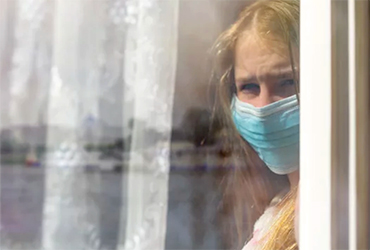By IDSE News Staff
Financial or food insecurity, the death of a loved one or a newly developed disability were three of the strongest predictors for whether a person who has been hospitalized with COVID-19 would experience symptoms of long COVID a year later, according to a new study.
A team led by researchers from NYU Grossman School of Medicine found more than half of the adult patients enrolled in the study experienced major life stressors and were at least twice as likely to report symptoms of depression, brain fog, fatigue, sleep disruption and other long-COVID–related symptoms (J Neurol Sci 2022;443:120487).

The researchers conducted a prospective, longitudinal cohort study of 790 patients hospitalized with COVID-19. The researchers collected the following outcomes at six and 12 months:
• disability using the Modified Rankin Scale (MRS);
• activities of daily living assessed with the Barthel Index;
• cognition assessed with the telephone Montreal Cognitive Assessment;
• Neuro-QoL batteries for anxiety;
• depression;
• fatigue and sleep; and
• post-acute symptoms of COVID-19.
The researchers used multivariable logistic regression to evaluate predictors of these outcomes, including demographics, pre–COVID-19 comorbidities, index COVID-19 hospitalization metrics and life stressors.
From the nearly 800 COVID-19 patients who survived hospitalization, 451 (57%) completed six-month (n=383) and/or 12-month (n=242) follow-up, and 77 patients died between the time of discharge and 12-month follow-up. The researchers found 121 patients who completed the 12-month follow-up (51%) reported life stressors. Financial insecurity, food insecurity, death of a loved one and new disability were the prominent independent predictors of worse MRS, Barthel Index, depression, fatigue and sleep scores, and prolonged COVID-19 symptoms, with adjusted odds ratios ranging from 2.5 to 20.8.
The researchers also noted older age, being female, baseline disability and severity of index COVID-19 were also predictors of poor outcomes.
The researchers concluded that life stressors contribute substantially to worse functional, cognitive and neuropsychiatric outcomes for patients a year after being hospitalized with COVID-19.
“Our study is unique in that it explores the impact of life stressors—along with demographic trends and neurologic events—as predictors of long-term cognitive and functional disabilities that affected quality of life in a large population,” said lead researcher Jennifer A. Frontera, MD, a professor in the Department of Neurology at NYU Langone Health, in New York City. “Therapies that lessen the trauma of the most stress-inducing life events need to be a central part of treatment for long COVID, with more research needed to validate the best approaches.”




